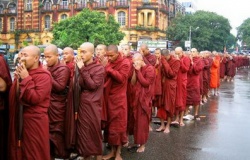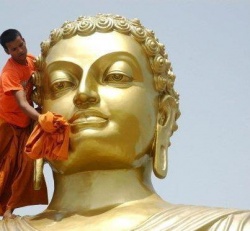Monastic rules
by Lama Yeshe and Lama Zopa Rinpoche
Besides following the vinaya rules, you must also observe the internal rules of the monastery. These are related to the vinaya but are not vows as such. For example, if you don't attend morning puja, you are not breaking a vow, but
still, you are breaking a Sangha community rule, so it's not so good. If you are sick, or if you have lung, an exception can be made. You can go to the gekö and explain that you are not well and ask permission to skip the puja. Lord
Buddha always took care of the sick; that's an exception. But if you don't have lung or some physical illness, not participating is very bad, very bad. Actually, I tell you, it means you have no compassion. Look at thangkas of what we call the rig-sum gom-po (Avalokiteshvara, Manjushri, and Vajrapani): sometimes Avalokiteshvara is in the center and below him, like servants or disciples, are Manjushri and Vajrapani. In other
representations you'll see Manjushri or Vajrapani in the middle and the other two below. This has great significance. Manjushri is the embodiment of enlightened wisdom, but sometimes he acts as Avalokiteshvara's disciple. He doesn't do
this for his own benefit but for that of others. We should be prepared to do the same thing. Shakyamuni Buddha himself is another good example of what I'm saying. When he came into this world as the son of a king, he was already
enlightened. He didn't need the worldly hassles of samsaric royalty and hundreds of wives. Do you think he needed all that hassle? No, of course he didn't. He was beyond hassles, but nevertheless, he manifested in that way for the
benefit of others. Similarly, even if you have supreme knowledge of sutra and tantra, even if you're an arya being or even Manjushri himself, in order to benefit the Sangha community, for the good of the majority, you should participate
in their activities as much as you can. If you are busy with some Dharma work or are sick, as I mentioned before, an exception can be made; just ask permission. In that case, you should not feel guilty. Everybody will understand.
Theoretically, I should tell you that monks and nuns should get up early in the morning, but I can't really push you on this because I don't get up early myself! I'm a bad example! Well, it depends on what time you go to bed. My nature
is not to go to bed early, so I get up late. I'm a bad example, so don't follow that. It's not so good, but I learned it from you people! But really, I strongly encourage you to go to bed early and get up early. Don't go to bed at 12: 30
or 1: 00 in the morning; 10: 00 or 11: 00 p. m., certainly before midnight, is much better. Then you can get up at 5: 30 or 6: 00 in the morning and do your practice, pray and meditate. Many of my Sangha seem to be just like Tibetans,
although I don't really know where this Tibetan trip comes from. It's not my trip; I don't know who set that example. They don't do their prayers and commitments in the morning, they just hang about distractedly all day. Then at
midnight, they suddenly freak out, pull out their books, and finally get down to doing their commitments. They put their pechas on their knees in front of them, but as soon as they start reciting, they nod off. Then they wake up and
continue for a while until they fall asleep again. Then they wake up again and find their book on the floor, so they have to start over. It takes a couple of hours just to do three pages! Then it's 3: 00 a. m. and they do a few more
lines and fall asleep once again. It goes on like this until the sun comes up. Then they just give up and go to sleep until lunch time. That Tibetan trip is not so good. I don't know who taught them that. It's better to sleep soundly;
sleep helps you. At least at that time your mind is tranquil and peaceful because your gross mind is absorbed. Then you awaken clean-clear, physically and mentally rested, and healthy. I am saying that when you do your prayers, you
should do them with full concentration and good motivation instead of just reciting your mantras mindlessly, "Blah, blah, blah. Okay, finished!" Then your sleep becomes so comfortable, so clean-clear. This is much better than the other
way. Each day in your life is so important. Your entire life is made up of these days, one after another. Therefore, you should organize your life: "When I get up I'm going to do this, then next I'll do this, then this, this, this.." You
should organize yourself. Then your life becomes useful, and you don't waste your time. If you make a program for your life, you'll see clearly how you waste your time. For example, the two hours you spend talking nonsense with your
friends benefits neither yourself nor others. If you don't make a program, you don't realize how much time you are wasting. So, make a general program, and within that a more detailed schedule. It's up to you; you can be flexible. But
somehow, you should organize every day of your life. It's very useful. When you do this, you should also make sure that you balance your activities: your intellect, your emotions, and your practical application. Organizing a balanced day
is very important. If you don't put one day together, then two days are not together, one month is not together, one year is not together, and you finish up wasting your entire life. That is why we need to organize our lives. And that's
where the monastery comes in. You don't realize it yet, but monastic life gives us a schedule for our daily lives. We should be very grateful for that, I tell you. When I went to the monastery, the rules made me get myself together in a
way that I could never have done alone. Monasteries are very, very useful. You can't imagine how much we human beings can accomplish; it's unbelievable. We can do so much but sometimes are unaware of our own ability. When you put
yourself into a situation that brings out the best in you, you can surprise yourself: "Incredible! I can do that!" After you've been in such a situation for some time, when you look back at what you have done, you feel so good, so very
proud of yourself. If you check what happens when you're in a place where there are no rules, you can see what a disastrous effect it has on your mind. That gives you a new appreciation of monastic discipline. Monastic rules are very
important, extremely important. For example, now, here, at this Dharma Celebration, you monks and nuns are living a monastic life: how do you feel? Is it beneficial or not? Do you feel that your attitude has changed or not? Has it made
your life easier? I think the answer to these questions is, yes. It is definitely true: we are supporting each other. And that's exactly what the lam-rim teaches: all our knowledge, our reputation, our goodness comes from mother sentient beings, from other people. You can see that this is scientifically true. It's not some kind of metaphysical gobbledygook. It is so important for us to support each other. You should, however, expect to find some rules in the monastery
that were not laid down by Lord Buddha himself. These are necessary because of the local environment. You should accept them, instead of negating them, "Oh, Lord Buddha never made that rule. Why do you say I can't do that?" First of all,
without realizing it, you have already accepted in principle the existence of such rules. For example, the long Tibetan zen that we wear. Lord Buddha didn't say anything about monks wearing long zens, but you accept them automatically.
Long zens are from Tibetan culture. Lord Buddha explained in detail how the teaching robe, the chö-gö, should be, but I never saw anything in the vinaya about long zens. But you just blindly accept them. You blindly accept certain things
just because Tibetan people do them; that's stupid. However, monastic rules make sense. They help you grow, and that is their only purpose. Otherwise, why would we make them? There would be no point. Who is responsible for seeing that
these rules are observed? Does everybody have authority? Can just anyone say, "Blah, blah, blah..."? No. It is the abbot and the gekö who have the authority to enforce the monastic rules. Therefore, when you go to a monastery you should
accept that "The abbot and the gekö are my dear friends, my spiritual friends, my leaders." You should have that attitude, that motivation, rather than think, "I'm Spanish, he's American. Why should I listen to him?" or "I'm Italian,
that Tibetan monk doesn't eat pizza. Why should I take any notice of what he says? He can't offer me pizza or mozzarella." You should change that attitude. He is kind; he works hard. It is not easy being the leader; you should have
compassion for him. The leaders are trying to help you, even though they may be experiencing many difficulties themselves. Don't think that they're on power trips when they tell you this or that. Understand that the rules are there to
benefit the majority. You are just one person. If you break the rules, you are damaging what benefits the majority; you are harming other sentient beings. Don't think that to harm others you have to stab them with a knife or do something
flagrant like that. Destroying what benefits the majority of the community means you are harming them. Ignorance is like that; it sees only "my benefit."




